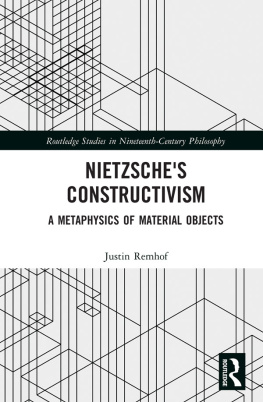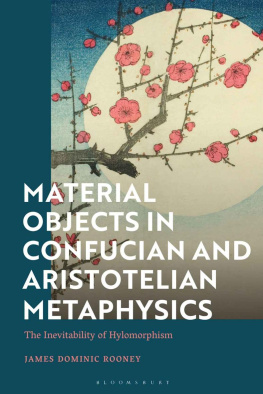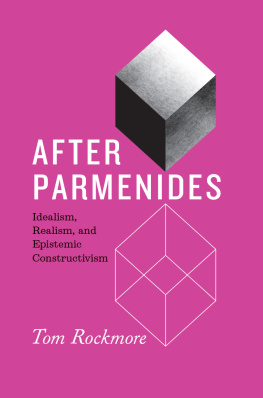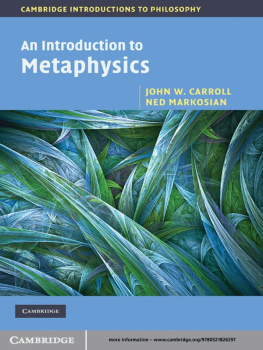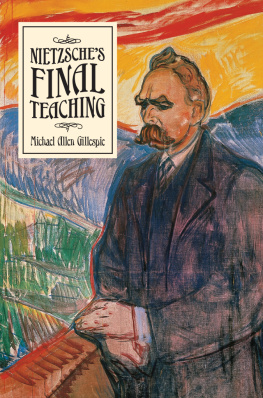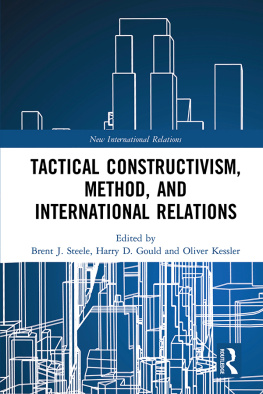Remhof - Nietzsches constructivism a metaphysics of material objects
Here you can read online Remhof - Nietzsches constructivism a metaphysics of material objects full text of the book (entire story) in english for free. Download pdf and epub, get meaning, cover and reviews about this ebook. City: New York London, year: 2018;2017, publisher: Taylor & Francis (CAM);Routledge, genre: Romance novel. Description of the work, (preface) as well as reviews are available. Best literature library LitArk.com created for fans of good reading and offers a wide selection of genres:
Romance novel
Science fiction
Adventure
Detective
Science
History
Home and family
Prose
Art
Politics
Computer
Non-fiction
Religion
Business
Children
Humor
Choose a favorite category and find really read worthwhile books. Enjoy immersion in the world of imagination, feel the emotions of the characters or learn something new for yourself, make an fascinating discovery.
- Book:Nietzsches constructivism a metaphysics of material objects
- Author:
- Publisher:Taylor & Francis (CAM);Routledge
- Genre:
- Year:2018;2017
- City:New York London
- Rating:3 / 5
- Favourites:Add to favourites
- Your mark:
- 60
- 1
- 2
- 3
- 4
- 5
Nietzsches constructivism a metaphysics of material objects: summary, description and annotation
We offer to read an annotation, description, summary or preface (depends on what the author of the book "Nietzsches constructivism a metaphysics of material objects" wrote himself). If you haven't found the necessary information about the book — write in the comments, we will try to find it.
Remhof: author's other books
Who wrote Nietzsches constructivism a metaphysics of material objects? Find out the surname, the name of the author of the book and a list of all author's works by series.
Nietzsches constructivism a metaphysics of material objects — read online for free the complete book (whole text) full work
Below is the text of the book, divided by pages. System saving the place of the last page read, allows you to conveniently read the book "Nietzsches constructivism a metaphysics of material objects" online for free, without having to search again every time where you left off. Put a bookmark, and you can go to the page where you finished reading at any time.
Font size:
Interval:
Bookmark:

Like Kant, the German Idealists, and many neo-Kantian philosophers before him, Nietzsche was persistently concerned with metaphysical questions about the nature of objects. His texts often address questions concerning the existence and non-existence of objects, the relation of objects to human minds, and how different views of objects impact commitments in many areas of philosophynot just metaphysics, but also language, epistemology, science, logic and mathematics, and even ethics. In this book, Remhof presents a systematic and comprehensive analysis of Nietzsches material object metaphysics. He argues that Nietzsche embraces the controversial constructivist view that all concrete objects are socially constructed. Reading Nietzsche as a constructivist, Remhof contends, provides fresh insight into Nietzsches views on truth, science, naturalism, and nihilism. The book also investigates how Nietzsches view of objects compares with views offered by influential American pragmatists and explores the implications of Nietzsches constructivism for debates in contemporary material object metaphysics. Nietzsches Constructivism is a highly original and timely contribution to the steadily growing literature on Nietzsches thought.
Justin Remhof is an Assistant Professor of Philosophy at Old Dominion University. He specializes in Nineteenth- and Twentieth-Century European Philosophy and Metaphysics. His work has appeared in journals that include European Journal of Philosophy, History of Philosophy Quarterly, Journal of Nietzsche Studies, and Nietzsche-Studien.
For a full list of titles in this series, please visit www.routledge.com
5Peirces Account of Purposefulness
A Kantian Perspective
Gabriele Gava
6Mills A System of Logic
Critical Appraisals
Edited by Antis Loizides
7Hegel on Beauty
Julia Peters
8Pragmatism, Kant, and Transcendental Philosophy
Edited by Gabriele Gava and Robert Stern
9An Interpretation of Nietzsches On the Uses and Disadvantages of History for Life
Anthony K. Jensen
10Hegels Philosophical Psychology
Edited by Susanne Herrmann-Sinai and Lucia Ziglioli
11Nietzsche and the Philosophers
Edited by Mark T. Conard
12Schopenhaurs Fourfold Root
Edited by Jonathan Head and Dennis Vanden Auweele
13Nietzsches Psychology of Ressentiment
Revenge and Justice in On the Genealogy of Morals
Guy Elgat
14The Kantian Foundation of Schopenhauers Pessimism
Dennis Vanden Auweele
15Nietzsches Constructivism
A Metaphysics of Material Objects
Justin Remhof

First published 2018
by Routledge
711 Third Avenue, New York, NY 10017
and by Routledge
2 Park Square, Milton Park, Abingdon, Oxon OX14 4RN
Routledge is an imprint of the Taylor & Francis Group, an informa business
2018 Taylor & Francis
The right of Justin Remhof to be identified as author of this work has been asserted in accordance with sections 77 and 78 of the Copyright, Designs and Patents Act 1988.
All rights reserved. No part of this book may be reprinted or reproduced or utilised in any form or by any electronic, mechanical, or other means, now known or hereafter invented, including photocopying and recording, or in any information storage or retrieval system, without permission in writing from the publishers.
Trademark notice: Product or corporate names may be trademarks or registered trademarks, and are used only for identification and explanation without intent to infringe.
Library of Congress Cataloging-in-Publication Data
Names: Remhof, Justin, author.
Title: Nietzsches constructivism : a metaphysics of material objects /
by Justin Remhof.
Description: 1 [edition]. | New York : Routledge, 2017. | Series:
Routledge studies in nineteenth-century philosophy ; 15 | Includes
bibliographical references and index.
Identifiers: LCCN 2017017097 | ISBN 9781138221567 (hardback :
alk. paper)
Subjects: LCSH: Nietzsche, Friedrich Wilhelm, 18441900. |
Constructivism (Philosophy) | Material culture.
Classification: LCC B3317 .R41665 2017 | DDC 193dc23
LC record available at https://lccn.loc.gov/2017017097
ISBN: 978-1-138-22156-7 (hbk)
ISBN: 978-1-315-41005-0 (ebk)
Typeset in Sabon
by Apex CoVantage, LLC
This book exists because certain people have believed in me and continue to believe in me. I have done my best not to let them down. I thank Bernard Gendron for opening my eyes to the world of Nietzsche, and Susan Hahn for helping me find my voice with Nietzsche. I thank Robert Schwartz for showing me the vision and depth of the American pragmatists, for introducing me to constructivism, and for mentoring my early philosophical development. I thank Arthur Melnick for sharing with me his unparalleled philosophical wisdom. I thank Richard Schacht for generously accepting me as his final advisee, for his unwavering trust in my work from the classroom to the North American Nietzsche Society, and for his ongoing insight and guidance. I thank William Schroeder for his dedication to helping me understand the importance of self-cultivation in Nietzsches work, for his critical and creative eye, and for showing me new ways philosophy can ignite and inspire. I thank Daniel Z. Korman for his passionate and selfless devotion to helping me grow as a philosopher, both personally and professionally. I thank Garrett Bredeson, Courtney Morris, John Timmers, James Jeffries, Joe Swenson, Erick Schaaf, Aaron Harper, Daniel Estrada, Todd Kukla, Adam Bowen, Robert Shanklin, and Erick Ramirez for their friendship, kindness, and thoughtfulness, which has advanced my reading of Nietzsche over the years.
The book has benefitted from comments offered by R. Kevin Hill, Rex Welshon, William Prior, Philip Kain, Garrett Bredeson, Robert Shanklin, Colin McLear, and Daniel Z. Korman. I also thank Helga Varden and Shelley Weinberg for comments on early stages of the project.
I thank my parents, Cheryl and Marc Remhof, for their loving encouragement, confidence, and respect, without which I could not have dedicated myself to the world of philosophy.
I thank Octavia for her patience, inspiration, and laughter, all of which keep me goinghand to paper, foot to grass, mind to movement. All the love, Tink.
Some arguments have previously been published, though most have been significantly reworked. Portions of developed from ideas originally published as Nietzsches Conception of Truth: Correspondence, Coherence, or Pragmatist?, Journal of Nietzsche Studies 46/2 (2015): 239238, and Naturalism, Causality, and Nietzsches Conception of Science, Journal of Nietzsche Studies 46/1 (2015): 110119. I am grateful to the editors of these journals for permission to reprint.
Like Kant, the German Idealists, and many neo-Kantian philosophers before him, Nietzsche was persistently concerned with metaphysical questions about the nature of objects. His texts often address questions concerning the existence and non-existence of objects, the relation of objects to human minds, and how different views of objects impact commitments in many areas of philosophynot just metaphysics, but also language, science, epistemology, logic and mathematics, and even ethics. When referring to an object, Nietzsche follows common German usage by employing Ding [thing] more often than Objekt [object], but the two are generally interchangeable. Both typically refer to concrete, macroscopic entities we experience in everyday life, such as trees and leaves, cats and dogs, and tables and chairs. The primary aim of this book is to present and defend the view that, according to Nietzsche, all such objects are socially constructed. Broadly, to say objects are socially constructed is to say objects are brought into existence by social practices. I call this view of objectswhich is clearly controversial
Font size:
Interval:
Bookmark:
Similar books «Nietzsches constructivism a metaphysics of material objects»
Look at similar books to Nietzsches constructivism a metaphysics of material objects. We have selected literature similar in name and meaning in the hope of providing readers with more options to find new, interesting, not yet read works.
Discussion, reviews of the book Nietzsches constructivism a metaphysics of material objects and just readers' own opinions. Leave your comments, write what you think about the work, its meaning or the main characters. Specify what exactly you liked and what you didn't like, and why you think so.

